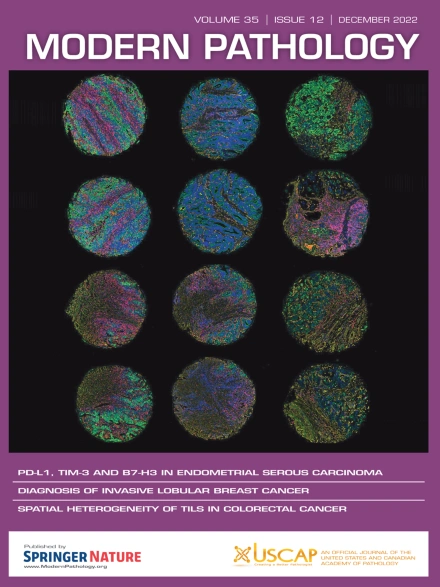靶向DNA测序在恶性蝶形花瘤诊断中的应用,重点关注角蛋白和p63表达的肿瘤。
IF 7.1
1区 医学
Q1 PATHOLOGY
引用次数: 0
摘要
乳腺恶性纺锤形细胞瘤的鉴别诊断通常介于恶性蝶形细胞瘤(MPT)和移行细胞癌(MBC)之间。由于弥漫性基质增生、角蛋白(CK)和/或 p63 免疫阳性以及 CD34 表达缺失,MPT 的诊断可能具有挑战性,尤其是在核心活检中。将 MPT 与 MBC 区分开具有临床意义,因为两者在手术方法、化疗和放疗方面存在差异。在本研究中,我们评估了 MPT(78 例肿瘤,64 例患者)的基质 CK、p63 和 CD34 表达情况,并通过靶向新一代 DNA 测序(NGS)对其中的一个子集(n=31)进行了分析,并与 MBC(n=44)进行了比较。大多数 MPT(71%)CK+和/或 p63+,其中 32% CK+(25/77 灶性),65% p63+(32/66 灶性,10/66 斑片状,1/66 弥漫性)。30%的 MPT 同时表达 CK 和 p63(20/66),而 95% 的 MBC(40/42,p本文章由计算机程序翻译,如有差异,请以英文原文为准。
Targeted DNA Sequencing in Diagnosis of Malignant Phyllodes Tumors With Emphasis on Tumors With Keratin and p63 Expression
The differential diagnosis of malignant spindle cell neoplasms in the breast most frequently rests between malignant phyllodes tumor (MPT) and metaplastic carcinoma (MBC). Diagnosis of MPT can be challenging due to diffuse stromal overgrowth, keratin (CK) and/or p63 immunopositivity, and absent CD34 expression, which can mimic MBC, especially in core biopsies. Distinction of MPT from MBC has clinical implications, with differences in surgical approach, chemotherapy, and radiation. In this study, we evaluated MPTs (78 tumors, 64 patients) for stromal CK, p63, and CD34 expression and profiled a subset (n = 31) by targeted next-generation DNA sequencing, with comparison to MBC (n = 44). Most MPTs (71%) were CK+ and/or p63+, including 32% CK+ (25/77 focal) and 65% p63+ (32/66 focal, 10/66 patchy, and 1/66 diffuse). Thirty percent of MPTs expressed both CK and p63 (20/66), compared with 95% of MBCs (40/42, P < .001). CK and/or p63 were positive in CD34+ and CD34− MPTs. Recurrent genetic aberrations in MPTs involved TERT, TP53, MED12, CDKN2A, chromatin modifiers, growth factor receptors/ligands, and phosphoinositide-3 kinase (PI-3K) and MAPK pathway genes. Only MED12 (39%, 12/31) and SETD2 (13%, 4/31) were exclusively mutated in MPTs and not MBCs (P < .001 and P = .044, respectively), whereas PIK3R1 mutations were only found in MBCs (37%, 13/35, P < .001). Comparative literature review additionally identified ARID1B, EGFR, FLNA, NRAS, PDGFRB, RAD50, and RARA alterations enriched or exclusively in MPTs vs MBCs. MED12 was mutated in MPTs with diffuse stromal overgrowth (53%, 9/17), CD34− MPTs (41%, 7/17), and CK+ and/or p63+ MPTs (39%, 9/23), including 36% of CD34− MPTs with CK and/or p63 expression. Overall, MED12 mutation and/or CD34 expression were observed in 68% (21/31) MPTs, including 61% (14/23) of CK+ and/or p63+ tumors. Our results emphasize the prevalence of CK and p63 expression in MPTs and demonstrate the diagnostic utility of next-generation DNA sequencing, especially in MPTs with confounding factors that can mimic MBC.
求助全文
通过发布文献求助,成功后即可免费获取论文全文。
去求助
来源期刊

Modern Pathology
医学-病理学
CiteScore
14.30
自引率
2.70%
发文量
174
审稿时长
18 days
期刊介绍:
Modern Pathology, an international journal under the ownership of The United States & Canadian Academy of Pathology (USCAP), serves as an authoritative platform for publishing top-tier clinical and translational research studies in pathology.
Original manuscripts are the primary focus of Modern Pathology, complemented by impactful editorials, reviews, and practice guidelines covering all facets of precision diagnostics in human pathology. The journal's scope includes advancements in molecular diagnostics and genomic classifications of diseases, breakthroughs in immune-oncology, computational science, applied bioinformatics, and digital pathology.
 求助内容:
求助内容: 应助结果提醒方式:
应助结果提醒方式:


